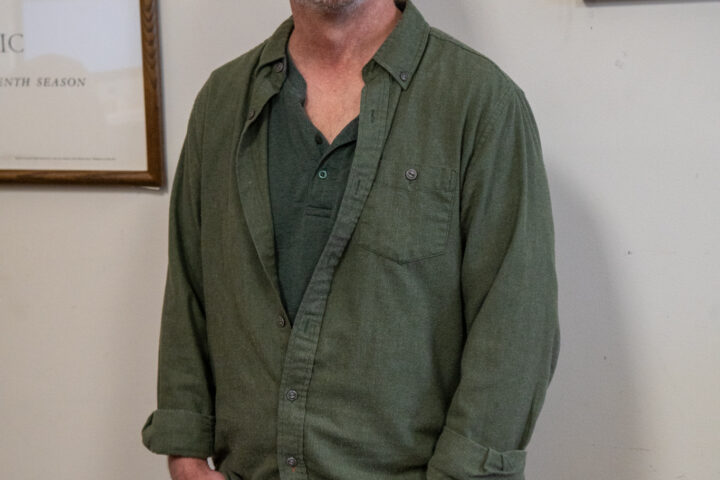During his eleven-year tenure in the Marvel Cinematic Universe (MCU), Thor has undergone arguably the most radical character reinvention of the entire superhero roster. He started out as the pugnacious and prideful prince of Asgard, who, even after several humbling experiences defending Asgard and Earth, remained one of the least likable MCU characters. That was until the release of Thor: Ragnarok (2017) and its massive tonal shift. Director Taika Waititi injected his signature rapid-fire style of jovial humor into the sober Thor franchise. Thor morphed into a quippy comedian and became the savior of the Asgardians. Also, as last seen, Avengers: Endgame (2019) depicts Thor at his emotional and physical nadir as husky Bro Thor, who retains his comedic chops. All of this is hilariously recapped by the always lovable Korg at the start of the film.
Thor: Love and Thunder introduce Thor as a lost soul who contemplates his life’s purpose, which can be extra tricky when you are a Norse god. He lives in a perpetual state of tranquility while halfheartedly fighting alongside the Guardians of the Galaxy. Above all, Thor dwells on his unresolved feelings for ex-girlfriend Jane Foster following their “mutual dumping.” After Thor says goodbye to Star-Lord and crew, he learns of Gorr the God Butcher’s massacres and his vendetta to slaughter all the gods. Thor returns to New Asgard to protect his people against Gorr’s onslaught and astonishingly encounters a Mjolnir-wielding Jane in the midst of combat. Together, they embark on a journey across the cosmos along with Korg and Valkyrie to rescue the Asgardian children, who’ve been kidnapped as bait. The team beseeches the aid of gods from various pantheons in order to have a chance against Gorr.
Chris Hemsworth is often overshadowed in ensemble films by his more popular costars, but he gets a chance to shine in Love and Thunder, not only through his towering physique and immense musculature. He also displays Thor’s emotional vulnerabilities more poignantly than ever before. Thor undergoes a beautiful journey of emotional healing and understanding the immeasurable value of love. Additionally, Hemsworth proves himself to be a criminally underrated comedic actor who is more than just an action star.
Natalie Portman reprises her role as Dr. Jane Foster, last seen on screen in Thor: The Dark World (2013), for a fantastic encore performance. Portman departed from the MCU after the second entry, dissatisfied with the limited scope of her role as a love interest and damsel in distress. Waititi and co-writer Jennifer Kaytin Robinson thoroughly rectify this issue and revamp the character in a more fully realized capacity as Foster joins the fight under the moniker “The Mighty Thor.” Portman crushes her new role and embodies the physicality of a superhero. Without spoiling specifics, the film effectively chronicles Jane’s journey and how she comes to wield Mjolnir so that the audience is not as taken aback as Thor. The chemistry between Jane and Thor has never been more potent. It is augmented by the light-hearted atmosphere that was never present in the first two Thor films. The cute banter between Jane and Thor gives off sweet romantic comedy vibes. Mjolnir and Stormbreaker add to the dynamic with amusing love triangle humor.
Gorr the God Butcher decisively ranks among the upper echelon of MCU villains as a compelling and sympathetic character. The film opens with a plaintive scene depicting Gorr’s origins before becoming the God Butcher. Gorr used to be a devout worshiper of the gods until his prayers failed to save his ailing daughter. He renounced his faith and swore to kill all gods with the divine powers of the Necrosword. At his core, Gorr is a grieving father who feels betrayed by religion. Christian Bale adroitly captures Gorr’s pain and repeatedly transforms his body to match Gorr’s emaciated figure. Gorr’s story is a moving cautionary tale about the dangers of blind absolute faith.
On a technical level, the film contains stunningly stylized action sequences. The voltaic special effects are absolutely gorgeous. Since Gorr utilizes shadows in combat, cinematographer Barry Idoine creatively contrasts light and shadows in magnificent black and white shot compositions.
As for flaws, Waititi’s style of humor is more of a double-edged sword this time around. The film bombards the audience with too many jokes per minute. The rapid succession of jokes causes many of them to miss the timing. The sheer abundance of jokes is exhausting. As a result, the film struggles to strike the right balance of drama and comedy in its more pivotal scenes. Thor: Love and Thunder is a rather inconsequential entry in the overarching plot of the MCU, but it features robust character arcs and riveting performances.
Rating: 7.5/10











